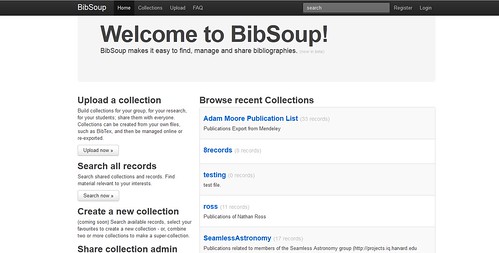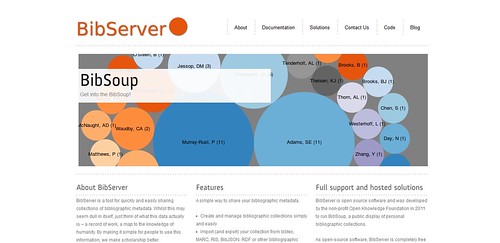BibSoup is here! And it’s going to revolutionise how you work with bibliographic metadata.
The team has been coding and blogging and bugfixing for a while now on the BibServer software, and we’ve mentioned in passing that our own instance has been up and running under the name of BibSoup… Now we are officially launching for beta fun, and asking the community to come and have a go and let us know what you think.
To get involved:
- View the features of the BibServer software
- Sign up at BibSoup.net and try uploading and viewing your collection
- Check out the example collections that some people have created already
- Watch our videos and screencasts and look out for more
- BibServer is available for use via BibServer.org and the repository
- Sign up to the OpenBiblio principles
- Learn more about our bibliographic JSON format at BibJSON.org
- Watch this demo of BibSoup:
Setting up a Bibserver and Faceted Browsing (Mark MacGillivray) from Bibsoup Project on Vimeo.
Share your collection with the world
If you are already used to managing your bibliography in tools like Zotero, Bibsonomy, Mendeley – or even in text editors using Bibtex or RIS – then you already have a collection and a management strategy, and probably even a way to collaborate with other people on it. But then, what do you do with it? At BibSoup you can upload it and create an interactive web page to share with anyone.
Search and faceted browse
Once your collection is up on BibSoup, you can search across all the records and filter by any value in your collection. You can also customise the view of your collection to show the most useful filters by default, or perform advanced searches using powerful query syntax.
Graph the vital statistics
Want to know which year most of your publications were published? Which author is most common in your collection? Which journal publishes the most relevant articles? Just use the visualise option to create a great bubble or bar chart based on one of your filter values, and quickly find and click the one you want.
Improve your collection
You can use your BibServer display to quickly spot errors in your records; then you can export and make improvements. Soon you will also be able to edit directly in the BibServer, and share collection management with others.
Use your records on the internet
Once your collection is in BibServer, it is even possible to use the content directly as references within pages that you create on the web. There is a full RESTful API and every page returns JSON (just add .json or &format=json if have URL parameters).
Export as BibJSON
BibServer uses a particular flavour of JSON that we call BibJSON; JSON formats are really useful for using on the web, and can quite easily be exported and used for fun things like the visualisations we demonstrate.
Learn more
We are continuing to work hard on the code – making the records editable is our current focus, along with further development of the BibJSON conventions.
Upload from BibTex or RIS sources is available, which means you can import data from most major bibliographic tools already; you can even use the parsers programmatically if you like. We would be happy to talk to anyone interested in developing more parsers too.
The aim of this project is to show how Open Bibliography enables scholarship; to show our community what we are missing if we do not commit to Open Bibliography; and to show that Open Bibliography is a fundamental requirement of a community committed to discovery and dissemination of ideas.
This project is run by the Open Knowledge Foundation Open Bibliographic Working Group, with funding from JISC via the Open Biblio 2 project, and with Cambridge University Library as lead partners.
We are building on the large collections – and the goodwill of the providers of those collections – that we received last year, to demonstrate how the content of such collections can be useful to the individual or small group, by enabling them to identify and share records of value to them (earlier BibServer work was funded with partial support from U.S. National
Science Foundation Award 0835773).
We hope you like BibSoup and find all this useful; do add your collections so we can share them with the rest of the world, too. Also if you would like your own BibServer, go ahead and download the code, or contact us for help / support options.
Naomi joined Open Knowledge Foundation in 2011. At various points she has been involved with administration, finance, project management, HR, the community network, events, communications, and other miscellaneous areas where a helping hand was needed.











This looks great. I was wondering if/when import and export tools are planned for Zotero, and maybe other widespread reference management software?